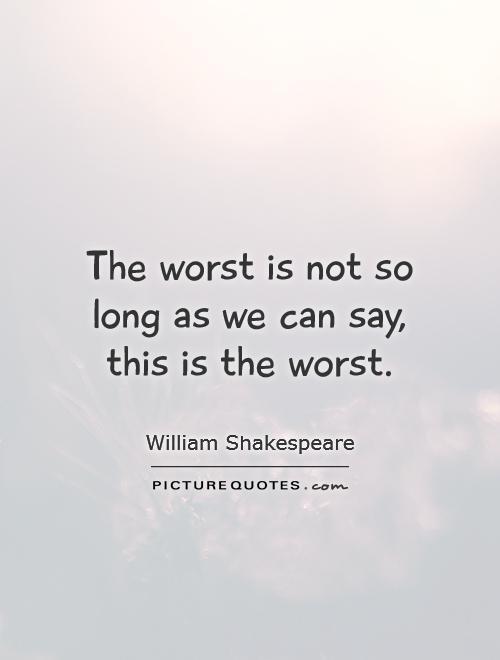The worst is not so long as we can say, this is the worst

The worst is not so long as we can say, this is the worst
In the world of William Shakespeare, the idea that "the worst is not so long as we can say, this is the worst" is a recurring theme in many of his plays. Shakespeare often explores the depths of human suffering and tragedy, showing characters facing unimaginable hardships and challenges. However, even in the darkest moments, there is always a glimmer of hope or a sense that things could be worse.One of the most famous examples of this theme can be found in Shakespeare's play "King Lear." In this tragedy, the titular character faces betrayal, madness, and the loss of everything he holds dear. At one point, Lear is left out in a storm, abandoned by his daughters and stripped of his power and dignity. In this moment of despair, Lear declares, "I am a man more sinned against than sinning." Despite his suffering, Lear is able to find some solace in the fact that things could be even worse.
Similarly, in "Macbeth," the titular character descends into madness and tyranny as he becomes consumed by his ambition. As Macbeth's crimes pile up and his guilt weighs heavily on him, he reflects on the futility of his actions, saying, "Life's but a walking shadow, a poor player that struts and frets his hour upon the stage and then is heard no more." Even in the depths of his despair, Macbeth is able to acknowledge that his actions have led him to the worst possible outcome.
Overall, Shakespeare's exploration of the idea that "the worst is not so long as we can say, this is the worst" serves as a reminder that even in the darkest moments, there is always a glimmer of hope or a sense that things could be worse. This theme adds depth and complexity to Shakespeare's works, showing the resilience of the human spirit in the face of adversity.












 Friendship Quotes
Friendship Quotes Love Quotes
Love Quotes Life Quotes
Life Quotes Funny Quotes
Funny Quotes Motivational Quotes
Motivational Quotes Inspirational Quotes
Inspirational Quotes